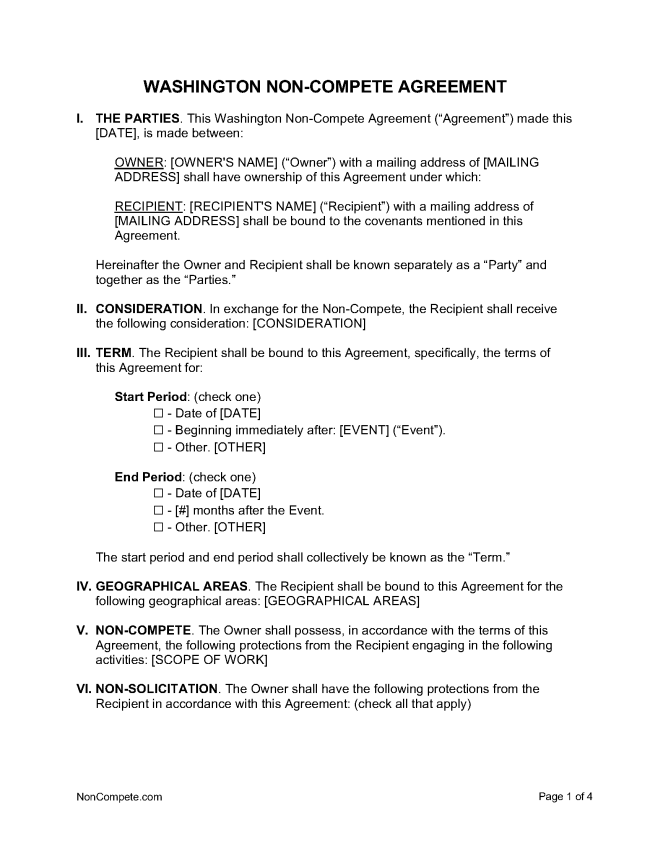A Washington non-compete agreement is a portion of a contract that limits a person’s ability to engage in direct competition with their former employer or the buyer of their business. Because of the public policy considerations implicated in any contract that restricts freedom of trade, Washington courts will carefully examine non-compete agreements and enforce them only to the extend that the terms are necessary, fair, and reasonable.
Table of Contents |
Are Non-Competes Enforceable in Washington?
Non-compete agreements are enforceable in Washington to protect the legitimate interests of a business, but courts carefully examine even valid non-competes to ensure that business interests are properly balanced with competing interests in freedom of trade. (Knight, Vale & Gregory v. McDaniel (1984))
Reasonableness
Courts will evaluate the reasonableness of a non-compete agreement based on three factors:
- Whether it is necessary to protect the business interests of the enforcing party
- Whether the agreement burdens the employee to a greater extent than that which is required to prevent harm to the enforcing party
- Whether enforcement would be contrary to public policy by virtue of limiting the restricted party’s service and skill which could otherwise benefit the public
(Emerick v. Cardiac Study Ctr., Inc., P.S., (2015))
Protectable Interests
- Trade secrets (Uniform Trade Secrets Act 19.108.010(4)) and other sensitive information
- Goodwill in the sale of a business (Emerick v. Cardiac Study Ctr., Inc., P.S., (2015))
- Client relationships and contacts (Wood v. May (1968))
Attorneys (prohibited)
A contract cannot restrict the right of an attorney to practice law, except in relation to the sale of a law firm or pertaining to retirement benefits. (Rules of Professional Conduct 5.6)
Terminating an Employee
So long as the agreement is otherwise valid and there is no bad faith on the part of the enforcing party, non-competes are enforceable against an employee who is terminated. (Knight, Vale & Gregory v. McDaniel (1984))
Burden of Proof
In a dispute concerning the enforceability of a non-compete agreement, the burden of proof rests with the employer to show that a protectable interest exists and that actual harm is posed if the restraint is not upheld. (Emerick v. Cardiac Study Ctr., Inc., P.S., (2015))
Continued Employment (consideration)
In general, new consideration is required to support a non-compete agreement set forth during the course of an existing employment relationship. (Labriola v. Pollard Group, Inc. (2004)) This can take the shape of benefits or promises, such as a promotion, pay raise, or special training, to which the employee was not already entitled.
Maximum Term
There are no judicial or statutory rules in Washington as to the maximum acceptable term for a non-compete agreement. Though courts may look to analogous cases for guidance, time limits must be reasonable given the circumstances of each individual case. (Wood v. May (1968))
Blue Penciling (allowed)
If an otherwise valid non-compete agreement contains unreasonable terms, courts will modify and enforce the agreement to the extent that it is reasonable. (Sheppard v. Blackstock Lumber Co., Inc. (1975)) In Armstrong v. Taco Time Int’l (1981), the court reduced a five-year covenant to 2.5 years and limited its geographic scope; in HomeTask Handyman Services Inc v. Szewczyk (2007), a non-compete was enforced with territory limits decreased from 100 to 25 miles.
